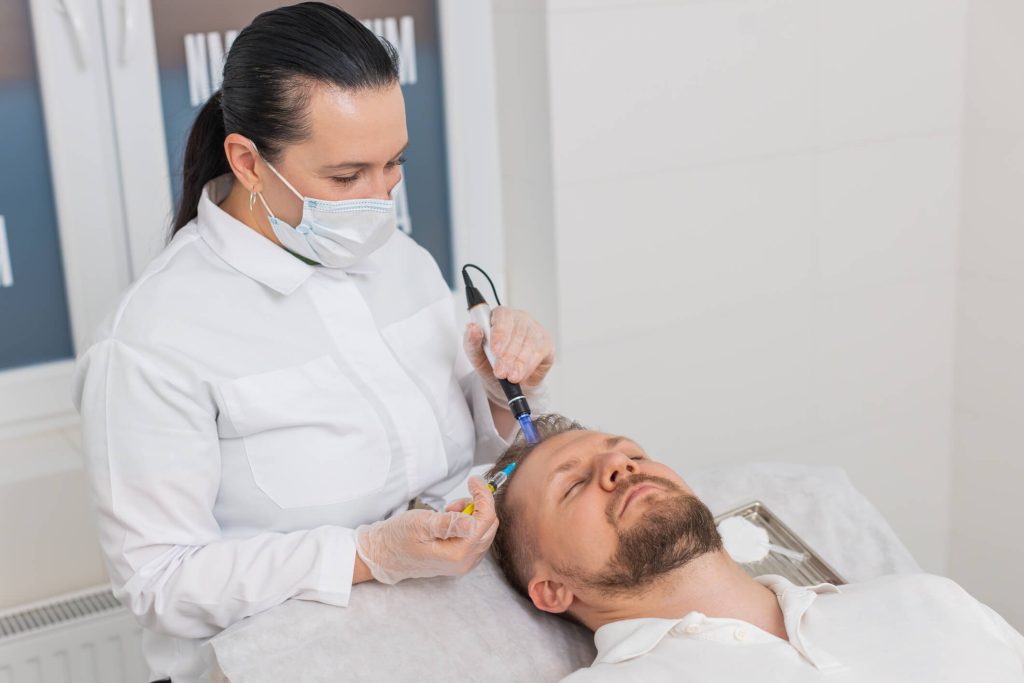In the world of weight loss and diabetes management, Mounjaro has emerged as a promising treatment. As patients experience significant changes in their body composition, questions about its side effects have also arisen. One of the more concerning side effects that some patients have reported is hair loss, including symptoms of shedding and thinning. If you’re considering Mounjaro or currently using it, you might wonder, Does Mounjaro cause hair loss? In such cases, regrowth may occur once the body stabilizes, but it’s always recommended to consult a dermatologist. They can help assess the cause, provide prescription treatments if necessary, and offer guidance for patients dealing with this issue.
This blog post addresses this concern, explaining the potential relationship between Mounjaro, weight loss, and hair loss and offering advice on managing these side effects. We’ll also explore the scientific reasoning behind this and provide expert tips for minimizing hair loss during treatment. We understand that patients may have concerns about this, and it’s essential to review the possible side effects and therapy options available. Consulting with a healthcare provider is key to ensuring proper management and addressing any patient concerns related to hair loss.
Understanding Mounjaro and Its Mechanism
Mounjaro (tripeptide) is a GLP-1 receptor agonist for treating type 2 diabetes and obesity. It mimics the effects of certain hormones in the body that help regulate insulin secretion, blood sugar levels, and appetite. Its primary function is to lower blood sugar and facilitate weight loss by making patients feel fuller faster, thus reducing their overall calorie intake. Research on the drug has shown promising results, but it’s essential to consider the potential risks and side effects. Clinical trials involving participants have used a controlled approach to monitor the long-term effects and risks of adverse events.
The medication has shown significant promise in clinical trials, with patients reporting substantial weight loss, improved blood sugar control, and reduced appetite. Alongside these benefits, some individuals may experience side effects like nausea, diarrhea, and, in some cases, hair loss. This leads us to the critical question—why does this happen, and is it reversible? A study has explored these effects, with some participants experiencing varying degrees of hair shedding. On platforms like Instagram, there are discussions around the number of people facing such issues, raising awareness of the potential side effects. Despite these concerns, there are rights to explore potential solutions, with some research suggesting that using a placebo group in trials can help determine the true impact of Mounjaro on hair loss.
The Connection Between Weight Loss and Hair Loss
While Mounjaro is an effective weight loss medication, rapid weight loss can trigger a type of hair loss called telogen effluvium. Telogen effluvium is a common form of temporary hair shedding that typically occurs two to three months after a significant change in the body, such as a dramatic weight loss. The condition is linked to physical and emotional stress, which can cause hair follicles to enter the resting phase of the hair cycle prematurely. Research suggests that a dose of medication may affect up to 3% of users in this way. It’s important to understand that this is a temporary condition, and many people regain hair growth over time as their body adapts. Using different products or adjusting how you manage your lifestyle, including diet and stress, can help minimize the effects. The FDA has approved Mounjaro for use, but discussing with a healthcare provider the best ways to manage side effects like telogen effluvium is essential.
When weight loss happens too quickly, as it sometimes does with weight loss drugs like Mounjaro, the body can become stressed. This can disrupt the normal hair growth cycle, causing more hair to shed than usual. This occurs for various reasons, but it’s often linked to the body’s adjustment to rapid changes. The good news is that hair loss due to telogen effluvium is usually temporary, and once the body adjusts to its new weight, hair growth tends to return to normal. Weight management, particularly with peptide-1 medications like Mounjaro, can also play a role in this process. Many people experience a return to a normal hair growth cycle once their bodies stabilize. If you search the internet, you may find others with similar experiences and tips on managing hair loss during this weight loss phase. With time and proper management, hair growth can return to normal and help individuals live their best lives.
Stress and Hormonal Changes
The stress associated with weight loss isn’t limited to the physical strain on the body. Medications like Mounjaro that affect hormones can also trigger changes in hair growth. Telogen effluvium is often triggered by a change in the body’s hormone balance, and medications like Mounjaro that impact insulin and other hormones can contribute to these changes. This highlights the importance of taking the proper steps to minimize side effects. Attention to the efficacy of the medication and how it affects the body’s systems is crucial. Understanding the causes behind telogen effluvium, such as hormone changes and the body’s stress response, can help guide individuals toward practical solutions. The right balance of nutrients, including minerals like iron and zinc, can also support hair health. As with any health content, the source of information plays a key role in ensuring you get accurate, reliable advice for managing side effects.
When the body is subjected to stress or a drastic shift in metabolism, such as weight loss, it can lead to a temporary hormonal imbalance that affects hair follicles. This imbalance may cause hair to shed prematurely and enter a resting phase, eventually leading to thinning or hair loss. While the effectiveness of medications like Mounjaro may vary from person to person, experts in medicine note that such side effects are typically temporary and can affect a small number of individuals, with some studies suggesting the rate may be as low as 1%. The amount of hair loss experienced may differ, but most people experience regrowth once their body adapts to the changes.
Nutritional Deficiencies and Their Role in Hair Loss
One of the lesser-discussed aspects of weight loss medications is their potential to lead to nutritional deficiencies. In the case of Mounjaro, patients may not be eating as much or consuming fewer calories due to the medication’s appetite-suppressing effects. This can lead to deficiencies in essential nutrients required for healthy hair growth, such as protein, iron, zinc, and B vitamins. Additionally, anxiety about side effects like hair loss may contribute to further stress, which can exacerbate the issue. Clinical trials have shown that such deficiencies may occur, and in some cases, a medical diagnosis of nutrient deficiency may require intervention, including adjustments to diet or supplements. In severe cases, surgery might be considered to address long-term health concerns. Still, for most people, the health benefits of Mounjaro outweigh the potential risks, primarily if the nutrient balance is managed carefully.
A well-balanced diet is crucial for maintaining healthy hair. Protein is vital because it is a key building block of hair. Iron and zinc are involved in cellular function and tissue repair, including the cells in hair follicles. Deficiencies in these nutrients can weaken hair, making it more prone to shedding.
When undergoing weight loss treatments like Mounjaro, it’s essential to maintain a nutrient-rich diet, even if appetite is suppressed. This may include incorporating more protein-rich foods, leafy greens, and whole grains into your meals. Supplements can also ensure you’re getting the nutrients you need to support hair health.
Weight Loss Medications and Their Effect on Hair
Hair loss is not unique to Mounjaro. Other weight loss medications, like Ozempic (semaglutide) and Wegovy (another GLP-1 medication), have been linked to similar side effects. Patients using these medications sometimes report experiencing telogen effluvium due to the rapid changes in their body. Along with hair loss, typical side effects of these medications can include constipation and stomach discomfort. These symptoms may be temporary and subside as the body adjusts, but monitoring them closely is essential. For more detailed information on these side effects, visiting a reliable site or consulting a healthcare provider for guidance is helpful.
Many individuals who have undergone weight loss treatments report some degree of hair shedding. This side effect is often more familiar with medications that cause a significant drop in body weight, as the body must adjust to the sudden changes. One common question is, “Does Ozempic Cause Hair Loss?” Like Mounjaro, Ozempic (semaglutide) and other weight loss medications have been associated with temporary hair shedding due to rapid weight loss. This condition is generally reversible once the body stabilizes and adjusts to the weight loss, but it’s essential to monitor any changes and consult a healthcare provider for guidance.
Some studies have suggested that hair loss is linked to the speed of weight loss and to the body’s metabolic changes during medication. For example, drugs that alter the body’s ability to absorb nutrients or affect hunger hormones might change hair follicle behavior. Though these changes are often temporary, it’s essential to know this possibility when beginning treatment.
Managing Hair Loss While on Mounjaro

Learn if Mounjaro leads to hair loss and find out how Neograft Hair Restoration in Orange County, California can provide the perfect solution.
If you are experiencing hair loss while on Mounjaro, it’s essential to understand that this is not necessarily permanent. Here are some strategies to help manage hair loss during weight loss:
- Consult a Doctor: If hair loss concerns you, you must speak with your healthcare provider. Your doctor can determine whether the hair loss is related to Mounjaro or if there’s another underlying issue. They may recommend adjusting your dosage or considering alternative medications.
- Focus on Nutrition: Ensure you consume enough nutrients to support healthy hair growth. Protein, iron, zinc, and B vitamins play a vital role in the growth and maintenance of hair. Consider speaking with a nutritionist or using supplements to ensure you’re meeting your nutritional needs.
- Consider Supplements: Some people find that hair loss can be managed with supplements designed to improve hair growth. These may include biotin, vitamin D, or omega-3 fatty acids, known to support hair health.
- Reduce Stress: Managing stress is crucial to supporting overall health and preventing telogen effluvium. Consider integrating relaxation techniques, exercise, and mindfulness into your routine to help reduce stress and its impact on your body.
- Scalp Care: Healthy hair begins with a healthy scalp. Regularly cleansing and moisturizing your scalp can help maintain an optimal environment for hair growth.
The Role of Hair Restoration
Hair restoration options might be considered for some individuals experiencing prolonged or severe hair loss. Neograft Hair Restoration is a minimally invasive treatment that can help restore hair follicles in areas affected by hair loss. The procedure involves harvesting healthy hair follicles from the donor area and transplanting them to areas where hair loss has occurred.
Hair restoration can provide a long-term solution to hair thinning or alopecia caused by medications or other factors. If you’re considering hair restoration, it’s essential to consult with a specialist who can guide you through the process and help you determine the best course of action.
Neograft Hair Restoration Orange County offers services to help patients regain their natural hair growth. Whether you’re dealing with hair loss due to medication, stress, or genetics, the team can help you explore your options and find the right solution for you.
Exploring Other Weight Loss Drugs: Side Effects and Hair Loss
As mentioned earlier, Mounjaro is not the only weight loss medication linked to hair loss. Other drugs, such as Wegovy and Ozempic, have similar mechanisms of action and side effects. These medications are effective for weight loss and managing type 2 diabetes, but like Mounjaro, they can lead to hair thinning or shedding in some individuals.
It’s essential to recognize that hair loss caused by weight loss medication is often temporary. Hair growth typically resumes once the body adjusts to the medication and the weight loss slows. In the meantime, patients should work closely with their healthcare providers to monitor their progress and make any necessary adjustments to their treatment plans.
Conclusion: Addressing Hair Loss During Weight Loss Treatment
Hair loss during weight loss treatment can be disheartening, but it’s important to remember that the condition is usually temporary. Whether you’re using Mounjaro, Ozempic, Wegovy, or other medications, the key is to manage your nutrition, reduce stress, and work closely with your healthcare provider to address any side effects.
Hair restoration treatments like Neograft Hair Restoration may offer a solution if you’re dealing with persistent hair loss. It’s always important to consult your doctor to understand your options and ensure you make the best health and well-being decisions.
Contact Us today for more personalized advice on weight loss, hair restoration, or managing side effects. Our team is here to help you navigate the complexities of weight loss treatments and ensure you achieve the best possible results. Whether you’re looking for information about Mounjaro, hair restoration, or managing side effects like hair loss, we’re here to guide you.
Frequently Asked Questions
How long does it take for hair loss to occur after starting Mounjaro?
Hair loss usually occurs 2-3 months after a significant change in the body, such as rapid weight loss or changes in hormone levels due to Mounjaro.
Can hair loss from Mounjaro be permanent?
No, hair loss from Mounjaro is typically temporary, and hair growth tends to return once the body stabilizes.
What other side effects might I experience while using Mounjaro?
In addition to hair loss, typical side effects include nausea, diarrhea, constipation, and stomach discomfort.
Can we prevent hair loss while taking Mounjaro?
Maintaining a healthy, nutrient-rich diet, reducing stress, and using hair growth supplements may help reduce the likelihood of hair loss.
Can hair loss occur with other GLP-1 medications like Ozempic or Wegovy?
Yes, hair loss has been reported with other GLP-1 medications, such as Ozempic and Wegovy, due to similar mechanisms affecting metabolism and hormones.
How can I manage stress to reduce the risk of hair loss while on Mounjaro?
Incorporating relaxation techniques, exercise, and mindfulness practices can help manage stress and reduce its impact on hair growth.
What role do nutritional deficiencies play in hair loss from Mounjaro?
Weight loss medications like Mounjaro may suppress appetite, leading to deficiencies in essential nutrients like protein, iron, zinc, and B vitamins, which are crucial for healthy hair growth.
Can a dermatologist help with hair loss caused by Mounjaro?
Yes, a dermatologist can assess the cause of hair loss, recommend treatments, and offer advice on managing the issue.
How can I support healthy hair growth while on Mounjaro?
A balanced diet rich in hair-supporting nutrients, such as protein, iron, and zinc, and supplements can help support healthy hair growth during weight loss.
Are there any medical treatments for hair loss caused by Mounjaro?
Sometimes, hair restoration treatments like Neograft Hair Restoration can help individuals deal with prolonged hair loss or thinning.



Recent Comments